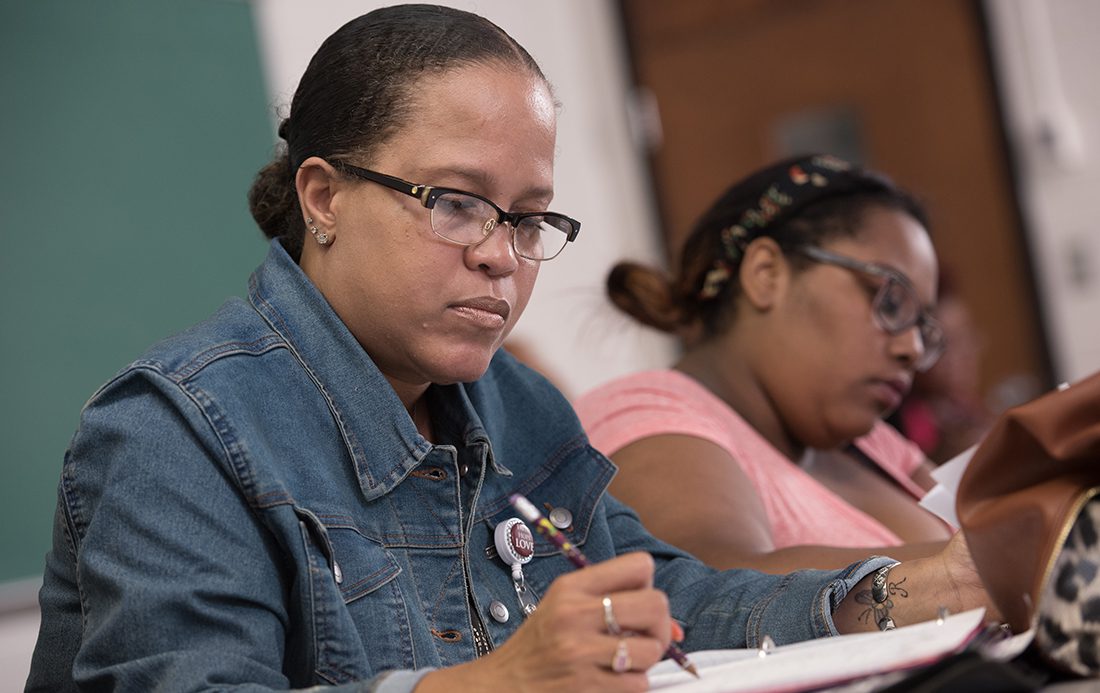Contact
 P:
252-398-6216
P:
252-398-6216

Questions
Contact our Undergraduate Admissions Team
Biology, Pre-Professional, B.S.
SOAR in the direction of a pre-professional career.
As a biology major, the pre-professional concentration is appropriate for students who wish to apply to medical, dental, veterinary, or other professional programs. The curriculum is designed to provide the necessary prerequisite coursework and opportunities for students to acquire sufficient foundational knowledge in biology, chemistry, physics and mathematics to prepare for the rigor of these programs.
Pre-dental is not a specific major. The term is used to describe students who plan to pursue a DMD (Doctor of Medicine in Dentistry) or a DDS (Doctor of Dental Surgery) after completing their undergraduate degree. Pre-dental students must complete courses required for admission to dental school, acquire the capacity to perform well on the Dental Admission Test (DAT), and gain the depth of knowledge necessary to be successful in dental school.
The Biology, Pre-Professional (Pre-Dental), B.S. is designed to provide prerequisite coursework and opportunities to acquire sufficient foundational knowledge to prepare pre-dental students for the DAT and the rigor of dental school. Pre-dental students are encouraged to begin a discussion with their academic advisor during their first year (to develop a plan) and continue these discussions throughout their undergraduate career (to receive information and advice on the timing and execution of that plan).
What does it mean to be Pre-Dental?
Pre-dental is not a specific major. The term is used to describe students who plan to pursue a DMD (Doctor of Medicine in Dentistry) or a DDS (Doctor of Dental Surgery) after completing their undergraduate degree. Pre-dental students must complete courses required for admission to dental school, acquire the capacity to perform well on the Dental Admission Test (DAT), and gain the depth of knowledge necessary to be successful in dental school.
Each dental school has its own specific prerequisites. All require two semesters each of biology, physics, general chemistry, and organic chemistry. Most require math (college algebra or calculus) and statistics. Most recommend additional coursework in biology and psychology. Because students will generally apply to more than one dental school, a degree program that provides a strong background in the natural sciences and “covers all the bases” is essential.
The Biology, Pre-Professional (Pre-Dental), B.S. is designed to provide prerequisite coursework and opportunities to acquire sufficient foundational knowledge to prepare pre-dental students for the DAT and the rigor of dental school. Pre-dental students are encouraged to begin a discussion with their academic advisor during their first year (to develop a plan) and continue these discussions throughout their undergraduate career (to receive information and advice on the timing and execution of that plan).
What Other Courses Should Pre-Dental Students Take?
Prerequisites vary among schools. We recommend that pre-dental students (in consultation with their academic advisor) conduct careful research on their preferred dental schools to make sure that they are using Electives in the Major, General Electives, or the Chowan VALUES Core to select courses that will meet or exceed each school’s prerequisites.
Because manual dexterity is essential to practicing dentistry (and is assessed during the dental school admissions process), we recommend that pre-dental students consider enrolling in General Electives that would help to develop or refine these skills (e.g., piano or violin lessons, drawing, painting, ceramics, sculpture, etc.).
What Else Should Pre-Dental Students Do Before Applying to Dental School?
- Get experience.
A strong dental school applicant will be able to demonstrate an understanding of the practice of dentistry. Shadowing a dentist is an ideal way to observe standard dental practices, learn discipline specific terminology, confirm your interest in the field of dentistry, add a relevant experience block to your resume, and acquire the ability to speak knowledgeably about the field during a dental school interview. Students completing relevant work, volunteer, or shadowing experiences may be eligible to receive credit toward their degree program (BIOL 493 – Cooperative Internship Experience).
- Develop manual dexterity skills
Manual dexterity is crucial for those who practice dentistry. The DAT contains a section designed to test this skill. During a dental school interview you will probably be asked to provide specific examples of how you have developed or refined your manual dexterity skills.
- Take the DAT
What is the DAT?
The Dental Admission Test (DAT) is required by all dental schools in the US and Canada and is an important component of a competitive dental school application.
The DAT has four sections.
- Survey of the Natural Sciences
- Perceptual Ability
- Reading Comprehension
- Quantitative Reasoning
Resources for Planning Your Dental Career
Pre-medicine (pre-med) is not a specific major. The term is used to describe students who plan to pursue an M.D. (Doctor of Medicine) or D.O. (Doctor of Osteopathic Medicine) after completing an undergraduate degree. Pre-med students must complete courses required for admission to medical school, acquire the capacity to perform well on the Medical College Admission Test (MCAT), and gain the depth of knowledge necessary to be successful in medical school. A degree program that provides a strong background in the natural sciences is essential.
The Biology, Pre-Professional (Pre-Medicine), B.S. is designed to provide prerequisite coursework and opportunities for students to acquire foundational knowledge (in biology, chemistry, physics and mathematics) that will prepare them for the MCAT and the rigor of medical school.
Pre-med students are encouraged to begin a discussion with their academic advisor during the first year (to develop a plan) and continue these discussions throughout their undergraduate career (to review progress and receive advice on the timing and execution of the plan).
Pre-optometry is not a specific major. The term is used to describe students who plan to pursue a Doctorate in Optometry (O.D.) after completing their undergraduate degree. Pre-optometry students must complete courses required for admission to O.D. programs, acquire the capacity to perform well on the Optometry Admission Test (OAT), and gain the depth of knowledge necessary to be successful in optometry school.
Each O.D. program has its own specific prerequisites. Because students will generally apply to more than one optometry school, a degree program that provides a strong background in the natural sciences and “covers all the bases” is essential.
The Biology, Pre-Professional (Pre-Optometry), B.S. is designed to provide prerequisite coursework and opportunities to acquire sufficient foundational knowledge to prepare students for the OAT and the rigor of an O.D. program. Pre-optometry students are encouraged to begin a discussion with their academic advisor during the first year (to develop a plan) and continue these discussions throughout their undergraduate career (to receive information and advice on the timing and execution of that plan).
Pre-pharmacy is not a specific major. The term is used to describe students who plan to pursue a Doctor of Pharmacy (PharmD) after completing their undergraduate degree. Pre-pharmacy students must complete of courses required for admission to PharmD programs, acquire the capacity to perform well on the PCAT (Pharmacy College Admission Test), and gain the depth of knowledge necessary to be successful in pharmacy school.
Each PharmD program has its own specific prerequisites. Because students will generally apply to more than one PharmD program, an undergraduate degree that provides a strong background in the natural sciences and “covers all the bases” is essential.
The Biology, Pre-Professional (Pre-Pharmacy), B.S. is designed to provide prerequisite coursework and opportunities to acquire sufficient foundational knowledge to prepare students for the PCAT and the rigor of a PharmD program. Pre-pharmacy students are encouraged to begin a discussion with their academic advisor during the first year (to develop a plan) and continue these discussions throughout their undergraduate career (to receive information and advice on the timing and execution of that plan).
Pre-physical therapy is not a specific major. The term is used to describe students who plan to enter a Doctor of Physical Therapy (DPT) program after completing their undergraduate degree. Pre-physical therapy students must complete courses required for admission to DPT programs, acquire the capacity to perform well on the Graduate Record Exam (GRE), and gain the depth of knowledge necessary to be successful in a physical therapy program.
Each DPT program has its own specific prerequisites. Because students will generally apply to more than one physical therapy school, a degree program that provides a strong background in the natural sciences and “covers all the bases” is essential.
The Biology, Pre-Professional (Pre-Physical Therapy), B.S. is designed to provide prerequisite coursework and opportunities to acquire sufficient foundational knowledge to prepare students for the rigor of a DPT program. Pre-physical therapy students may also want to consider the Biology, B.S. degree. This degree program covers the core prerequisite coursework for physical therapy programs, allows students more flexibility in selecting Electives in the Major, and requires fewer chemistry/biochemistry courses.
Pre-physical therapy students are encouraged to begin a discussion with their academic advisor during the first year (to develop a plan) and continue these discussions throughout their undergraduate career (to receive information and advice on the timing and execution of that plan).
Pre-physician assistant is not a specific major. The term is used to describe students who plan to enter a physician assistant (PA) program after completing an undergraduate degree.
Pre-physician assistant students must complete courses required for admission to PA programs, acquire the capacity to perform well on the Physician Assistant College Admission Test (PA-CAT), and gain the depth of knowledge necessary to be successful in a PA program.
Each PA program has its own specific prerequisites. Because students will generally apply to more than one PA program, an undergraduate degree that provides a strong background in the natural sciences and “covers all the bases” is essential.
The Biology, Pre-Professional (Pre-Physician Assistant), B.S. is designed to provide prerequisite coursework and opportunities for students to acquire foundational knowledge (in biology, chemistry, physics and mathematics) that will prepare them for the rigor of a PA program. Pre-physician assistant students are encouraged to begin a discussion with their academic advisor during the first year (to develop a plan) and continue these discussions throughout their undergraduate career (to review progress and receive advice on the timing and execution of the plan).
Pre-vet is not a specific major. The term is used to describe students who plan to pursue a Doctor of Veterinary Medicine (DVM) after completing their undergraduate degree. Pre-vet students must complete courses required for admission to veterinary school, acquire the capacity to perform well on the Graduate Record Exam (GRE), and gain the depth of knowledge necessary to be successful in a veterinary program.
Each veterinary program has its own specific prerequisites. Because students will generally apply to more than one veterinary school, a degree program that provides a strong background in the natural sciences and “covers all the bases” is essential.
The Biology, Pre-Professional (Pre-Veterinary Medicine), B.S. is designed to provide prerequisite coursework and opportunities to acquire sufficient foundational knowledge to prepare pre-vet students for the rigor of veterinary school. Pre-vet students are encouraged to begin a discussion with their academic advisor during the first year (to develop a plan) and continue these discussions throughout their undergraduate career (to receive information and advice on the timing and execution of that plan).
pre-health advisory programs
Several pre-professional advisory programs are available at Chowan through the Department of Biology. Included in this category are areas of Pre-Medicine, Pre-Dentistry, Pre-Nursing, Pre-Pharmacy, Pre-Physical Therapy and Pre-Veterinary Medicine. Students planning to pursue studies in any of these fields must plan their degree programs carefully. Although all require a similar core of science courses with laboratories, specific entrance requirements, entrance examinations, and admissions procedures vary from program to program. Students interested in these programs should contact the Biology Department and meet with the advisor to the program as early as possible.
